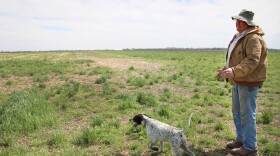-
The United Nations has declared 2023 the International Year of Millets — a type of small grain mostly grown in parts of Asia and Africa. The highly resilient and cost-friendly grains could make them the next crop for U.S. farmers in the midst of climate change.
-
Washington University researcher Natalie Mueller hopes to uncover wisdom from Indigenous cultures about growing new crops that are resilient to extreme drought and flooding.
-
Missouri farm income is projected to decrease $546 million in the coming year.
-
A new study shows a threefold increase in Midwest farm acres using the offseason crops to help protect the soil and reduce runoff, but it still makes up less than 8% of all farmland.
-
Legislation and programs in Missouri and other Midwestern states are paving the way to welcome large livestock operations by limiting local control over the facilities. Some rural residents worry about the potential pollution and decreased quality of life that will bring.
-
Missouri is home to more black walnut trees than any other place in the world. Its wild nature and distinct flavor means the black walnut often gets passed over for more popular European varieties — the kinds you normally see in grocery stores and restaurants. But these Missourians are making sure that the state’s native nut, and its importance to the culture of this region, gets its day in the sun.
-
For many people, fall is marked by taking trips to the pumpkin patch, getting lost in a corn maze or catching a hay ride. These seasonal activities are part of agricultural tourism, and it's a booming industry.
-
Barges are moving along the Mississippi River much more slowly and with lighter loads as they try to get corn and soybean harvest to ports.
-
Farm implement manufacturers, including giant John Deere, are well on their way to deploying autonomous tractors. Prototypes are in the field now, and they could be widely available by the end of the decade.
-
The U.S. Supreme Court will hear a case this month over whether California overreached with an animal welfare law which regulates housing requirements for pigs if the pork will be sold in the state. Two large pork industry groups say that burdens pork producers outside of California.









